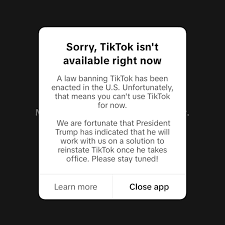The short lived disruption of TIKTOK
First it was gone at 6:00 AM Sunday morning, servers indicated TikTok was no longer available, then at 9:00 AM Tiktok was back.
TikTok. What happened this weekend? Did someone turn the wrong switch? Despite the law, TikTok is back online in the United States. Was there an 11th-hour injunction by the Supreme Court? There has yet to be any public or media explanation for this occurrence. Did American internet providers ignore the law?
Was this due to the final moments of the Biden administration and the imminent inauguration of Donald Trump?
During the past several months rumors appeared and much discussion was found on social media about the Chinese ownership of TikTok presenting a national security threat.
The story of TikTok and national security concerns in the U.S. revolves around fears that the app, owned by the Chinese company ByteDance could pose risks to user data privacy and national security. Here are the key points:
Background
Popularity: TikTok has rapidly gained popularity, especially among younger users, becoming one of the most downloaded apps globally.
Data Collection: TikTok collects vast amounts of user data, including location, device information, and user interactions, raising concerns about how this data is stored and used.
National Security Concerns
Chinese Ownership: U.S. officials worry that the Chinese government could potentially access user data through ByteDance, which could be used for espionage or influence operations.
Content Manipulation: There are fears that TikTok could be used to manipulate content or spread misinformation, impacting public opinion or elections.
Government Action
Bans and Proposals: In response to these concerns, various government officials and agencies have proposed bans on TikTok. The Trump administration sought to ban the app outright in 2020, citing national security risks, although legal challenges halted this effort.
Ongoing Investigations: The Biden administration has continued to scrutinize TikTok, with discussions about requiring the company to divest from its U.S. operations or imposing stricter regulations.
Public Debate
Support for the App: Many users and advocates argue against a ban, citing free speech and the app's role in creativity and social connection.
ByteDance's American lobbying team is led by Michael Beckerman[69][67] and includes former US Senators Trent Lott (R-Mississippi) and John Breaux (D-Louisiana) as well as former US Representatives Jeff Denham (R-California), Bart Gordon (D-Tennessee) and Joe Crowley (D-New York).[
Economic Impact: Some concerns banning TikTok could hurt U.S. businesses and creators who rely on the platform for income and visibility.
Current Status
As of now, the debate continues, with ongoing discussions about how to address national security concerns while balancing user freedom and economic implications. The situation remains fluid, with potential regulatory measures being considered.


